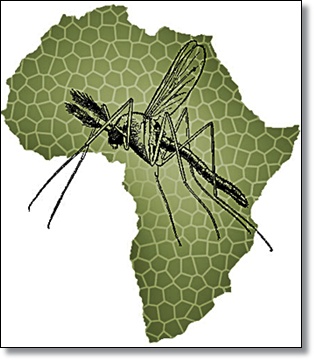Malaria: Influential Study Questioned

 |
Current WHO guidelines recommend insertion of an artesunate pill (suppository) in the rectal cavity before the child is sent to a health center. It does not cure malaria but can reduce its pace of progression. Initial, mostly hospital-based, studies indicated that the chance of survival and healthy recovery after subsequent appropriate treatment may be increased. But actual field studies of the efficacy and feasibility of the proposition were lacking.
The WHO recommendation attained a firm scientific footing in 2009 upon the publication of a trial led by Dr. Melba Gomes in the prestigious journal Lancet.1 The trial was conducted under the auspices of major international agencies and universities, involved eminent experts in the field, and recruited nearly 18,000 cases from Bangladesh, Ghana and Tanzania. And it firmly advised the use of rectal artesunate as a pre-referral therapy for suspected severe malaria.
An accompanying comment in the journal described the paper by Gomes et al. as one of the most important papers of the decade on malaria.2 Subsequently, it won the British Medical Group’s prestigious Research Paper of the Year Award for 2010. Its findings are now cited by malaria experts and international guidelines for treatment of severe malaria.
Research on an issue of paramount public health importance must maintain high scientific standards. Otherwise validity and credibility are compromised and public health may suffer. Did the trial of Gomes et al. follow required standards? To address this question, Professors Karim F Hirji and Zulfiqarali G Premji of the Muhimbili University of Health and Allied Sciences in Tanzania performed a comprehensive assessment of this trial. Their findings, published in the journal Trials in August 2011, are surprising, if not shocking.3 They demonstrate in meticulous detail that the scientific quality of this trial was severely compromised due to “numerous serious deficiencies in design, implementation, and methods of data analysis.” These deficiencies were of sufficient extent and gravity to render the trial “a flawed study whose conclusions remain subject to appreciable doubt.”
Among the deficiencies they found were serious shortfalls in training and supervision of recruiters-cum-care providers, inadequate follow-up of cases, unsatisfactory levels of missing key data items, deletion of one-third of randomized subjects from analysis, highly inappropriate data analysis methods, selective interpretation, and inconsistent descriptions of the same aspects of the study. They also reanalyzed the available data with more appropriate methods and found that the conclusions did not match those drawn by Gomes et al.
The Hirji and Premji paper does not directly address the utility of rectal artesunate as a pre-referral treatment for severe malaria. Rather it states that the issue is of too great an importance to be decided by distinctly low-quality research. They also question the rationale for conducting the study, indicating that the focus should be on improving access to health care in rural areas, a move which would broadly benefit people with varied serious health problems, rather than on taking disease specific stop gap measures.
The paper raises troubling questions: How can such research appear in a major, peer-reviewed journal? Why is it universally praised by experts? Why was it awarded one of the most prestigious prizes in medical research? How can it form the basis for global guidelines for the treatment of severe malaria? Do not the afflicted children deserve better quality research to protect their health? How should research priorities be determined?
The paper is expected to draw attention on the often deficient quality of health research done in poor nations and encourage improvement of the standards of design, conduct, analysis and interpretation of the research.
Dr. Melba Gomes responded to the criticism of the trial she led in the same issue of the journal Trials.4 Her response is brief, addresses only a few issues, and does not give additional supporting evidence. Her co-authors have thus far remained silent.
By Professor Karim F Hirji
The author is with the Department of Epidemiology and Biostatistics at MUHAS. A medical statistician with numerous papers in the theory and applications of biostatistics, he is the author of the sole book on methods of analysis small sample data. Professor Zulfiqarali G Premji is with the Department of Parasitology and Medical Entomology at MUHAS. He has worked in and led a number of clinical trials in prevention and treatment of malaria. For further information, contact them at Muhimbili University of Health and Allied Sciences, P. O. Box 65015, Dar es Salaam, Tanzania, or respectively, by e-mail at kfhirji@aol.com and zulpremji688@gmail.com
References:
[1] Gomes MF, Faiz MA, Gyapong JO, Warsame M, Agbenyega T, Babiker A, Baiden F, Yunus EB, Binka F, Clerk C, Folb P, Hassan R, Hossain MA, Kimbute O, Kitua A, Krishna S, Makasi C, Mensah N, Mrango Z, Olliaro P, Peto R, Peto TJ, Rahman MR, Ribeiro I, Samad R, White NJ, the Study 13 Research Group: Pre-referral rectal artesunate to prevent death and disability in severe malaria: A placebo-controlled trial, Lancet, 2009, 373:557--566.
[2] von Seidlein L, Deen JL: Comment: Pre-referral rectal artesunate in severe malaria, Lancet, 2009, 373:522--523.
[3] Hirji KF, Premji ZG: Pre-referral rectal artesunate in severe malaria: a flawed trial, Trials, 2011, 12:188 (http://www.trialsjournal.com/)
[4] Gomes M: Response to: Pre-referral rectal artesunate in severe malaria: a flawed trial, Trials, 2011, 12:189 (http://www.trialsjournal.com/)
http://www.trialsjournal.com/content/12/1/189
Letter Response to: Pre-referral rectal artesunate in severe malaria: a flawed trial Melba Gomes Trials 2011, 12:189 (8 August 2011) [Abstract] [Provisional PDF] [PubMed] [Related articles]
Methodology Pre-referral rectal artesunate in severe malaria: a flawed trial
Karim F Hirji, Zulfiqarali G Premji Trials 2011, 12:188 (8 August 2011) [Abstract] [Provisional PDF] [PubMed] [Related articles] [Cited on BioMed Central]
Note: This is an explanatory document written and circulated by Professor Karim F. Hirji. The reader is advised and encouraged to consult the original documents
